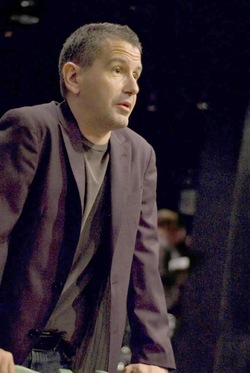Most of today’s Wall Street Journal drama column is devoted to David Cromer’s off-Broadway staging of Our Town, followed by a brief report on BAM Harvey’s Winter’s Tale. The headline tells the story. Here’s an excerpt.
* * *
What are the true classics of American theater, the shows that have decisively survived the test of time and now look to be of permanent significance? While I can think of a fair number of plays that are credible candidates for the top-five list, only two, Tennessee Williams’ “The Glass Menagerie” and Thornton Wilder’s “Our Town,” strike me as absolutely inevitable. That David Cromer should have directed both of these plays in close succession might well seem presumptuous, but Mr. Cromer appears to have the imaginative wherewithal to put his stamp on any number of classics. Like the haunting “Glass Menagerie” that he staged in January for Kansas City Repertory Theatre, Mr. Cromer’s rethinking of Wilder’s 1938 masterpiece, which has opened Off Broadway after a much-praised run in Chicago, is a re-creative landmark, at once arrestingly original and essentially faithful in its approach to the author’s well-loved text.
As usual with Mr. Cromer, most of what happens in this production is pretty much what the author had in mind, only more so. Wilder’s purpose in writing a play without scenery, as he explained in 1939, was to stimulate “the cooperative imagination of the audience” by offering it a deeper, more poetic realism, one not dependent on the old-fashioned traditions of naturalistic stage design. Accordingly, Mr. Cromer and Michele Spadaro, his set designer, have rebuilt the interior of the Barrow Street Theatre as a three-quarter-round performance space with aisles wide enough to allow the performers to pass among the spectators. (The original Broadway production was performed in a conventional proscenium-stage theater.) The “stage” is the floor, the “set” eight chairs and a pair of wooden tables that look as though they’d been pilfered from the basement of a small-town church. No attempt of any kind is made to suggest the outward appearance of Grover’s Corners, the turn-of-the-century New Hampshire village where “Our Town” is set. Even the “costumes” worn by the cast are nondescript modern-day street clothes identical to those worn by the members of the audience.
 The result is a performance that doesn’t feel like a performance at all. It’s as though the actors were simply showing us the play, an illusion underlined by the fact that Mr. Cromer has cast himself as the Stage Manager who narrates “Our Town.” He speaks his lines in an unsentimental, utterly matter-of-fact way, thereby giving the impression that he is not playing a character but merely being himself. (I actually saw him strolling through the lobby before Monday’s preview, wearing the same outfit that he wears onstage.) Mr. Cromer’s seemingly artless anti-acting is central to the effect of this production, in which the wall that separates illusion from reality becomes as porous as the one that separates the actors from their audience….
The result is a performance that doesn’t feel like a performance at all. It’s as though the actors were simply showing us the play, an illusion underlined by the fact that Mr. Cromer has cast himself as the Stage Manager who narrates “Our Town.” He speaks his lines in an unsentimental, utterly matter-of-fact way, thereby giving the impression that he is not playing a character but merely being himself. (I actually saw him strolling through the lobby before Monday’s preview, wearing the same outfit that he wears onstage.) Mr. Cromer’s seemingly artless anti-acting is central to the effect of this production, in which the wall that separates illusion from reality becomes as porous as the one that separates the actors from their audience….
The Bridge Project, in which London’s Old Vic and New York’s BAM Harvey Theater are jointly producing a pair of classics directed by Sam Mendes, has now opened the second installment of its inaugural offering, a staging of “The Winter’s Tale” that is even more of a mixed bag than “The Cherry Orchard,” with which it is playing in repertory. Mr. Mendes and his British-American cast have reconfigured Shakespeare’s complex, coincidence-laden play as a semi-modern domestic melodrama whose 19th-century setting sheds no clarifying light on the text, just as the actors, fine though they are, mostly fail to find the music in the verse….
* * *
Read the whole thing here.
Terry Teachout on the arts in New York City
An ArtsJournal Blog
